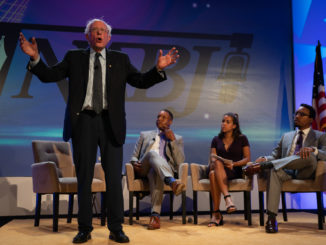
By Deidre Montague
NABJ Monitor
COVID-19 has impacted many sectors of the workforce, including journalism. However, the pandemic also revealed the importance and relevance of the Black press.
Aaron Eaton, the digital coordinator of The Philadelphia Tribune, the oldest continuously published newspaper serving African Americans, said his newsroom lost revenue and some staff because of COVID-19.
Johann Calhoun, former senior editor at The Philadelphia Tribune, says that one of his biggest concerns was making sure that both jobs and the well-being of employees were safe and taken care of.
This is especially important and difficult for Black press because they don’t have the financial resources that many mainstream press organizations do, he said.
“Mainstream outlets, they have the finances, they have the resources, where they can automatically work remote, whereas some Black press outlets were unable to do that,” Calhoun said. The Tribune offered the remote option to a number of employees, but “it was mostly in house work.”
The Black press was having a hard time before the pandemic, said Tene Croom, the current co-chair of the NABJ Black Press Task Force, and during the pandemic many shifted to digital.
“Honestly, the Black press has always struggled. So it wasn’t really that much of a big hit,” she said, and now the pain is being felt in the mainstream. “If you notice mainstream media now, a lot of them and cities are having some of the similar issues, having to go to printing once a week, having to be just online.”
Sasha Allen Walton and Endera Allen, editors of Northend Agent’s, Connecticut’s largest and longest-published African American newspaper, said they had to rethink the entire operation to keep the paper afloat. That included shifting up marketing, preparing to launch a new website, choosing strategic philanthropic partnerships, supporting Black businesses and providing accurate information about COVID-19 while not overwhelming their readers with pandemic stories.
“Anything that can relinquish some of the load on the top, we removed,” Allen Walton said. “In fact, we increased journalists during COVID. … We just really assessed what was working for us and what wasn’t.”
Amid pain, some saw growth
The irony of 2020 is that African American businesses had their best years in advertising, said Dr. Benjamin Chavis, president of The National Newspaper Publishers Association, a trade organization for Black press.
“You had this health pandemic, but you also had an epidemic of white supremacy, an epidemic of racially motivated police brutality where the response was the Black Lives Matter movement,” he said. “So that gave more, not just content, but value. The Black press was more valued to get people to get the vaccines.”
Eaton said The Philadelphia Tribune experienced some growth during the past year as well some pain.

“During COVID is when George Floyd protests happened. So not only do we see some of our lowest numbers, we saw some of our highest numbers during the pandemic, inversely, at the same time,” Eaton said. “So it’s been a weird last two years or so. For us, we’ve took major losses and major pluses at the same time.”
The Atlanta Voice Newspaper had one of its best fiscal years, despite COVID-19, due to advertisement and promotional income, Publisher Janice Ware said. Election advertising helped boost the bottom line in 2019 and 2020, she said.
“It was a better year for us, and it probably would have been without those two things taking place,” she said.
The Atlanta Voice is a nonprofit, founded by Ware’s father, “and we were able to then apply for and receive a lot of grant dollars to continue supporting,” she said.
Importance of the Black press
Croom said supporting the Black press is important.
“We are the ones who can tell the story like no other. It takes us to tell the story,” she said. “Now, granted, there are African Americans, people of color at mainstream newspapers doing a fabulous job. But when it comes to NNPA newspapers, the Amsterdam News and some of the other papers, there is nothing like it. Because we dig deeper, we go more to the heart of the story. Because we have more time and more print space to the story, we can do it better, we just do.”
Ware agrees that no one can tell Black stories better than the Black press.
“We have been charged with chronicling our history, letting people know what really did take place. And if we are not the ones we’re telling our stories, who’s gonna tell them?” he said. “If you’re not African American and you don’t live in these communities, you don’t feel our pain and our pressure. You can’t talk and you can’t speak or relate to our people the same way we can.”
Added Calhoun, “When you’re able to tell your own life, it’s richer, it’s deeper. There’s truth to it. And there’s more facts that’s provided to the reader.”
Allen Walton said there’s a credibility with the Black press in the community that the mainstream media cannot match. “You saw the impacts of white media that’s trying to tell us to get the vaccine. But what happened is no one trusts you. So you had to get Black doctors and Black media to say ‘Hey, the choice is yours, but here’s the resources and the information for you to make the decision that’s best for you.’
“And I saw for the first time older people in the family saying ‘I’m not listening to that other media. I’m waiting for our media to say something.’”
Eaton said that beyond serving the Black community, the Black media provides a window into this world for those who are not a part of it.
“You have Black media, Black press, where other cultures can come in and read newspapers, magazines, watch videos, content rooted for Black people to kind of understand what we are going through in our lives and what it means to be Black in America or around the world globally,” he said. “So Black press kind of serves that purpose, not only for us as Black people, but for other cultures to kind of understand who we are, what we’re all about, what we like, what we don’t like, and some things that are important to us.”
Pandemic relief and new opportunities
Though COVID-19 caused significant impact, it also allowed members of the Black press to gain new skills and opportunities to fund new projects.
Chavis said The National Newspaper Publishers Association helped many members of the Black press through the NNPA Digital Network by providing training.
“We went through training with a special project with Google News initiative,” he said, “training their staff in digital advertising, the digital technology infrastructure necessary to engage in programmatic digital advertising that was very successful.”
He also talked about the training offered to member publishers, editors, photographers and videographers. He checks training for website developers, to make sure that they are staying engaged, but in a way that generates profit or revenue, so that their businesses can be sustainable, even through crises.
NABJ has also offered support to the Black Press during the pandemic, specifically through the Black Press Grant, which was funded by the Chan Zuckerberg Initiative. This $300,000 grant allowed freelancers and Black owned media organizations to write stories about how COVID-19 has impacted the Black community and education issues and receive up to $10,000 in funding.
The coordinator for the NABJ Black Press Grant project, founder Sandra Dawson Long Weaver went into detail about the application process.
“We set up an application form, so people could apply for the grant,” she said. “You needed to say what type of stories you would be doing for what publication. It could also be digital stories, it could be video stories, photo stories.”
Twenty-eight grants were awarded, she said, for various amounts up to $10,000.
When applicants were approved for a grant, they received the first half of the money to begin the project. The second half comes when the project has been completed and seen by Weaver and her team. She is now in the process of reviewing final projects.
“A number of people are sending in the stories that they have written or the video or the links to what they’ve done,” she said. “And we’re actually starting to put those on a website so they can be seen.”




Be the first to comment